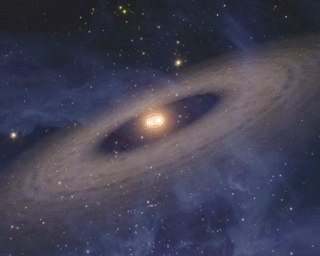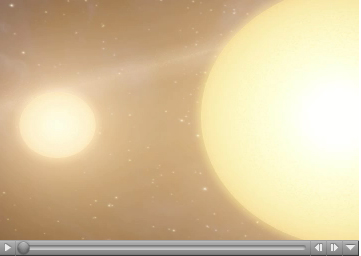
|
Two Suns Raise Family of Planetary Bodies (Artist Animation)
- Click the image above for a larger view
 Movie Download Options
Movie Download Options- Full-Res JPEG (3000 x 2400) (309.2 kB)
- Full-Res TIFF (3000 x 2400) (21.6 MB)
Caption:

Click on the image for animation
(
Half Resolution
)
This artist's animation depicts a faraway solar system like our own -- except for one big difference. Planets and asteroids circle around not one, but two suns. NASA's Spitzer Space Telescope found evidence that such solar systems might be common in the universe.
The movie begins by showing two snug, sun-like stars. It then pans out to show an Earth-like planet and a surrounding disk of asteroids and comets.
Spitzer did not see any planets directly, but it detected dust that is kicked up from disks like this one. The disks were spotted circling all the way around several double, or binary, stars, some of which were closer together than Earth is to our sun. In fact, Spitzer found more disks in orbit around close-knit binary stars than single stars. This could mean that planets prefer two parent stars to one, but more research is needed to figure out exactly what's going on.
Cataloging Keywords:
| Name | Value | Additional Values |
|---|---|---|
| Target | ||
| System | ||
| Target Type | Exoplanet | |
| Mission | Spitzer Space Telescope | |
| Instrument Host | Spitzer Space Telescope | |
| Host Type | Space Telescope | |
| Instrument | ||
| Detector | ||
| Extra Keywords | Artwork, Binary, Color, Dust, Infrared, Movie | |
| Acquisition Date | ||
| Release Date | 2007-03-29 | |
| Date in Caption | ||
| Image Credit | NASA/JPL-Caltech/Univ. of Ariz. | |
| Source | photojournal.jpl.nasa.gov/catalog/PIA09229 | |
| Identifier | PIA09229 | |
